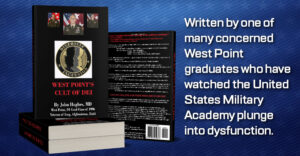Open Letter to The Long Gray Line
23 March 2022 2024-10-25 13:53Open Letter to The Long Gray Line
By John Hughes, USMA ’96
On 17 March 2022, I submitted an open letter to the Superintendent of USMA expressing my concerns about the culture of drug use at West Point. Within 4 days, the letter had been viewed over 28,000 times and had numerous endorsements from graduates of all of service academies including several retired flag officers.
The overwhelming response prompted me to further explore the topic and the issues to offer additional perspectives from a West Point graduate, a prior military physician, a combat veteran, and current civilian physician. As of the submission of this letter, I have received no official response from the Superintendent’s office. The following are my observations and conclusions:
11 March 2022 – The New York Times reported that 5 USMA cadets on Spring Break purchased cocaine from a Florida cocaine dealer. Several overdosed, requiring CPR and hospitalization. Several cadets claimed to become intoxicated via CPR performed on their West Point friends.1
19 March 2022 – The New York Post reported that USMA has had an ongoing culture of cocaine use, especially in athletes, dating back to at least 2017 when former cadet Chris Monge was imprisoned for being a drug user, dealer, and kingpin at West Point.2 Monge was one of 6 investigated in 2016 for drug dealing at West Point.3
When analyzing the available information regarding these series of events, three major areas of concern surface. First and most obvious, is the engagement in illegal behavior by future officers in the United States military. Second, is the degradation of the adherence to and intolerance of violations of the Honor Code. Third, is the impotence of a series of leaders to demonstrate any serious dedication to impacting change.
Curbing illegal behavior, while challenging, is actually the most straight-forward of these concerns to address. The military has long used “random” urinalyses to deter the use of illegal drugs and to use the results as evidence in the prosecution of drug users. However, with a simple online search, anyone can easily learn that most drugs of abuse only remain detectable in urine specimens for up to 2-3 days. The question then becomes, “How much of a deterrent are ‘random’ urinalyses if they’re not conducted when cadets are on breaks that last longer than 2-3 days?”
It is reasonable that those determined to use quickly metabolized illegal drugs can easily avoid positive urine drug tests, especially if given advanced warning of the dates of urine tests. Assuming cocaine is difficult to obtain and likely requires a network of contacts and/or drug dealers, especially in different states, the cadets involved in this specific incident were unlikely to be novices in illegal drug use.
This further supports the hypothesis that the deterrent measures are largely ineffective. Metaphorically, using random urinalyses is equivalent to addressing a cockroach infestation by stepping on a few cockroaches before they run back into hiding…obviously this will be completely ineffective.
From a medical perspective, utilizing technology that capitalizes on specimens that show drugs (and their metabolites) for much longer periods is the next logical escalation of assessment. Albeit more costly, testing hair samples may function in a more thorough capacity since drugs (and their metabolites) remain in hair for up to 90 days.
The leadership would then be expected to take appropriate, swift, and severe punitive actions against offenders. Eliminating and deterring criminal behavior requires consequences. Equally, if not more importantly, to addressing the pattern of criminal behavior is addressing the culture of poor ethical decision making that enabled behavior.
“The only thing necessary for the triumph of evil is that good men should do nothing.”--quote often attributed to Edmund Burke
In this case, the evil referenced in Burke’s quote is not the individual’s but rather the culture that does not teach these young adults the long-term implications of their actions. The Academy appears to be in a state of transition, albeit not necessarily for the better. As members of the Long Gray Line, we can frequently see from the bird’s eye view what those imbedded in the trenches at the Academy may not. The current culture that is enabling future officers to engage in such severe transgressions is not likely to produce officers of the caliber seen in World War II.
In the drug use situation referenced throughout this letter, several of the cadets claimed to have been exposed to a toxic level of Fentanyl via CPR administered to their fellow cadets. Fentanyl toxicity in CPR providers is mostly theoretical and if it has actually occurred would be so exceedingly rare as to be considered more myth than reality according to toxicologists.4
Assuming the extraordinarily low probability of the veracity of these cadets’ statements, it is discouraging to consider that they thought this flimsy claim would be believed by authorities and leadership rather than believing in the importance of honesty. Seemingly, “When you mess up, fess up” was not instilled in these young cadets.
There is a rising movement to soften standards for honor and discipline at the academies as a ‘sign of the times.’ Consider the Air Force Academy’s current consideration of eliminating the toleration portion of their Honor Code as an example. I would argue that the moral and cultural decline across the US is exactly why West Point must stick to its charter and be rigid and inflexible in its rules.
Cadets, as humans, will never be perfect. While the admissions process has historically done a great job of filtering applicants, in the end it is the Honor Code, academics, and military structure that serve as the gatekeepers to remove unsuitable cadets. Honor and rule violations are not necessarily an indication of a problem, but rather a suggestion that the system is working.
The recent uptick in violators combined with the current leadership’s response, though, has the attention of the Long Gray Line. If the current leadership is unwilling or unable to identify and take the necessary steps to change this culture, then we must weigh in to be truly dedicated to eliminating the problem in the service of molding officers in the world’s most powerful military.
In 1997 Apple fired CEO Gil Amelio after nearly bankrupting the company and welcomed Steve Jobs back.5 In 1943 General Fredenall failed at the Battle of Kasserine Pass and was replaced by General Patton.6 Head NFL coaches are usually fired within 3 years if they don’t show success.7
Most successful organizations remove ineffective leaders to become better. These firings of vetted superb leaders speaks to the expectation that our culture has: accomplish the mission you’re hired to do or you will be replaced.
While the stakes are higher at West Point than on professional football teams or corporations, the leadership dilemma is the same. It is not personal, it’s mission accomplishment.
The 79th Commandant assumed duties in early 2021. The commandant is head of the Department of Tactics and, under the Superintendent, is responsible for the administration, discipline, and military training of cadets at the academy. He arrived at a very challenging time caused by self-inflicted social unrest, mass Honor Code violations, and ethical problems involving prior Superintendents.
Compounding these difficulties, I posit that the drug culture never went away after the 2016/2017 investigations and a number of cadets continued to abuse cocaine. Good officers usually see opportunity in adversity to prove their leadership abilities.
It is my opinion as a physician with 20 years of examining drug abuse that the cocaine culture was well entrenched and the cadets had an organized system over the years to obtain it, use it, and evade detection. After over a year to address the drug problems, the Commandant failed to root out and end the drug issue.
The method appears to be one of tolerance and silencing dissenting views. The true motive for discouraging the exercising of our First Amendment rights by the Superintendent in his letter to the Long Gray Line has not yet been disclosed butprotecting senior leaders from scrutiny and/or extracurricular teams is plausible.
Cadets memorize Worth’s Battalion Orders which begins with “But an officer on duty knows no one – to be partial is to dishonor both himself and the object of his ill-advised favor.” Just as the Commandant should have been impartial and more aggressive in meting out drug abusers, the Superintendent should not hesitate to replace the Commandant with a more effective leader.
The position of Commandant is bigger than one person. Just like in other professions, firings frequently improve the organization by finding the right person for the right job at the right time and by alerting the organization that significant change is underway.
Although the Commandant most surely had a great career prior to returning to West Point, the ineffectual handling of criminal behavior and ethics violations as well as the enabling culturesuggests he is not the most effective person to be current Commandant.
The current leadership appears to be failing in its fundamental mission of instilling in cadets an understanding of the long-term broader impact of misdeeds while at West Point. Change, admittedly will not be easy and both the Academy and graduates will have to tolerate the actions to fix the crisis as well as the repercussions in the news and with the Academy’s extracurricular teams’ performances.
In summary, addressing the current issues at USMA is no small feat, but as a board certified Emergency Physician and member of the Long Gray Line, I make the following observations and recommendations:
1. Replace the Commandant with a more aggressive officer to quell the drug culture at West Point and restore order and discipline.
2. Institute biweekly urine testing and monthly hair follicle testing to make it more difficult for cadets to evade drug testing procedures and maintain this pace until assured that users have been identified.
3. Assist drug offenders to enter drug rehab programs after they have been processed out of the Academy and military and after time served for crimes.
4. Investigate the sources of cocaine for cadets and also the possibility that cadets were assisted with advanced warnings or other means and prosecute the enablers.
5. Return to the foundational ethics and teachings based upon a rich history of adherence to an Honor Code that allows us to place our faith and trust in the integrity in our brothers and sisters in arms.
Just as it is expected of providers in all of the health professions to be analytical thinkers to advance their respective fields, we, as members of the Long Gray Line, should reflect on the Academy’s turbulence and scandal of the past few years and signal to the leadership that the current course is in line with disaster and not mission accomplishment.
Cadets and current USMA faculty may not initially understand, like, or appreciate our responses to events. But as Americans and graduates we have a right and the duty to voice our dissent.
My priorities are God, family, country, Academy, in that order. I pray that the Superintendent finds a more effective leader to fill the Commandant post and correct current deficiencies so that the future inductees into the Long Gray Line can serve to protect my family and our country.
It is my hope then that conversations can shift from current day crises and concerns about the quality of cadets to future-oriented optimism about the continuity of excellence within the members of the Long Gray Line.
John Hughes
USMA Class of 1996 (#1 graduate)
3rd Generation West Pointer
4 combat tours of duty in Iraq and Afghanistan
American Doctor
This article reflects the opinion of the author and not of any organization or corporation.
1Patel, Vimal. West Point Cadets Overdose During Spring Break in Florida, Officials Say. New York Times. 11 March 2022.
2Kennedy, Dana, et al. Cocaine and pain pills: Inside Secret Drug Culture at West Point. New York Post, 19 March 2022.
3Hill, Michael. West Point Cadets Face Courts-Marital for Drugs. www.armytimes.com 1 March 2017.
4Nelson, Lewis et al. ‘Passive’ fentanyl exposure: more myth than reality. www.statnews.com 21 Dec 2018
5Brian, Matt. A Look at Apple’s CEOs from 1977 to 2011. Thenextweb.com
6Zimmerman, Dwight. Command Failure: Lloyd Fredendall and the Battle of Kasserine Pass. Defensemedianetwork.com 14 Feb 2022.
7Kirwin, Pat. These 10 NFL Head Coach firings are the worst of the worst. Cbssports.com 2 Jun 2013.



















